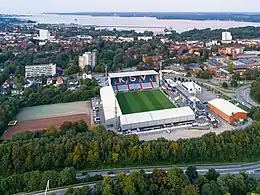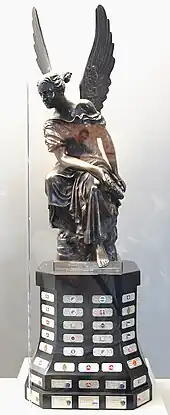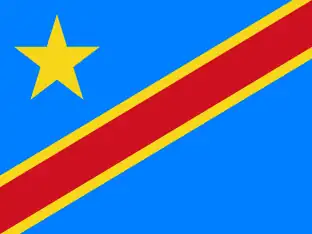 | ||||
| Full name | Kieler Sportvereinigung Holstein von 1900 e.V. | |||
|---|---|---|---|---|
| Nickname(s) | Die Störche (The Storks) | |||
| Founded | 7 October 1900 | |||
| Ground | Holstein-Stadion | |||
| Capacity | 15,034 | |||
| Executive director | Wolfgang Schwenke | |||
| President | Steffen Schneekloth | |||
| Head coach | Marcel Rapp | |||
| League | 2. Bundesliga | |||
| 2022–23 | 2. Bundesliga, 8th of 18 | |||
| Website | Club website | |||
|
| ||||
Kieler Sportvereinigung Holstein von 1900 e.V., simply as KSV Holstein or Kieler SV Holstein, commonly known as Holstein Kiel (German pronunciation: [ˌhɔlʃtaɪn ˈkiːl] ⓘ), is a German association football and sports club based in the city of Kiel, Schleswig-Holstein. From the 1900s through the 1960s the club was one of the most dominant sides in northern Germany. Holstein appeared regularly in the national playoffs, capturing their most important title, the German football championship in 1912, and finishing as vice-champions in 1910 and 1930. Holstein also won six regional titles and finished as runners-up another nine times. They remained a first-division side until the formation of the Bundesliga in 1963.
History
Foundation to WWII
Holstein Kiel is the product of the merger of predecessor sides Kieler Fußball-Verein von 1900 and Kieler Fußball-Club Holstein. The earliest of these two sides was Kieler Fußball-Verein (later 1. KFV) established on 7 October 1900 out of the membership of the gymnastics club Kieler Männerturnvereins von 1844. The club was not very successful and never loomed large in football generally. Later the club concentrated on track and field athletics.
Kieler Fußball-Club Holstein was formed on 4 May 1902 and was renamed Fußball-Verein Holstein von 1902 (FV Holstein Kiel) sometime in 1908.[1] The club quickly became competitive and in 1910 they reached the German championship final where they lost 0–1 in extra time to Karlsruher FV. In 1912 they captured the German championship with a 2–1 overtime semi-final victory over defending champions Viktoria 89 Berlin followed by a 1–0 win in the final over the previous year's champions, Karlsruher FV.[2] In 1914, the club renamed again after the new branches of hockey and athletics were added, becoming Sportverein Holstein von 1902.
On 7 June 1917, 1. Kieler Fussball Verein von 1900 and Sportverein Holstein von 1902, severely weakened by World War I, merged to form the current day club. As is common practice in Germany, the new association adopted the foundation date of the older club, while taking up the ground, kit, colours, logo and the name Holstein from SV Holstein Kiel. Through the 1920s, the team made regular appearances in the national playoffs and in 1926 reached the semi-finals where they were eliminated 1–3 by SpVgg Greuther Fürth. In 1930, they played their way to the final, losing 4–5 to Hertha BSC. The following year they reached the semi-finals where they were eliminated 0–2 by TSV 1860 Munich.
Under the Third Reich, German football was re-organized into sixteen top flight divisions. Kiel played in the Gauliga Nordmark and consistently delivered solid top-five finishes, but were frustrated in their pursuit of a division title. In 1942, the Gauliga Nordmark was broken up into the Gauliga Hamburg and Gauliga Schleswig-Holstein. No longer in the company of Hamburger SV and other strong teams from the city, Kiel immediately captured the title of the new division and defended it over the next two seasons until the end of World War II brought play to a halt across the country.
Those titles earned Kiel entry into the national playoff rounds. They made their best run in 1943 when they advanced as far as the semi-finals before being put out by eventual champions Dresdner SC. The team captured third place by defeating FC Vienna Wien. The next year, they were eliminated early on and no final was played in 1945.
Postwar to present


Since the end of the war, Kiel has primarily been a tier II and III club. After the conflict, football in the western half of the country was re-organized into five regional top flight divisions. Holstein Kiel played from 1947 until 1963 in the Oberliga Nord (I) and twice finished as runners-up (1953, 1957). In 1961 the reserve team captured the German amateur championship. After the 1963 formation of a single national first division known as the Bundesliga, the club became a second division side and played in the Regionalliga Nord (II). Kiel failed in its attempt to advance to the Bundesliga after its 1965 Regionalliga Nord championship. German football was restructured in 1974 with the formation of a new second division known as the 2. Bundesliga and the team slipped to third division play in the Amateuroberliga Nord (III). Holstein Kiel won promotion to second-tier competition in 1978 as part of the 2. Bundesliga Nord and was relegated in 1981.
With the reunification of Germany in 1990 teams from the former East Germany became part of a combined national competition. German football was re-organized again in 1994 and Holstein Kiel qualified for the new tier three division Regionalliga Nord (III). In 1996 the club was relegated for the first time to the Oberliga Hamburg/Schleswig-Holstein (IV) and returned to Regionalliga Nord (III) in 1998. They were relegated again to the Oberliga Hamburg/Schleswig-Holstein (IV) after failing to qualify for the restructured Regionalliga (III) which went from four divisions to two. They did advance the next year and narrowly missed promotion to the 2. Bundesliga in the 2005–06 season. By 2007 they had slipped to the Oberliga Nord (IV), but earned two consecutive promotions to reach the new 3. Liga (III) in 2009. After one year in the third division the club were relegated again in the Regionalliga Nord (IV). The team reached the quarter-finals of the 2011–12 DFB-Pokal, after beating FC Energie Cottbus, MSV Duisburg and 1. FSV Mainz 05. In the quarter-final they lost to Borussia Dortmund 4–0. Since 2013 the club played again in the third division and in 2017 they were promoted after 36 years to the second division. In the 2017–18 2. Bundesliga, after Holstein Kiel finished in 3rd place as the highest-scoring team with 71 goals, they lost 4–1 on aggregate to Wolfsburg in the relegation play-offs. In 2019, the club entered an official partnership with American USL League Two club San Francisco Glens SC. The team reached the semi-finals of the 2020–21 DFB-Pokal after beating Bayern Munich in the second round.
In the 2020–21 2. Bundesliga, Holstein Kiel missed the chance of direct promotion to the Bundesliga by losing the last two matches in the league by the same score 3–2 against Karlsruher SC and SV Darmstadt 98, to finish in third place behind VfL Bochum and Greuther Fürth. In the promotion play-offs, they won the first leg away 1–0 against FC Köln but lost the second leg at home 5–1 to miss another chance of promotion.[3]
Honours

National titles
- German Championship
- Champions: 1912
- Runners-up: 1910, 1930
- German Cup
- Semi-finals: 1941, 2021
- Quarter-finals: 1943, 2012
- Round of 16: 1962, 1966, 1971, 1979, 2019
Regional
- Northern German football championship (I)
- Champions: 1910, 1911, 1912, 1926, 1927, 1930
- Runners-up: 1914, 1922, 1923, 1928, 1929, 1931, 1932
- Gauliga Nordmark (I)
- Runners-up: 1937
- Gauliga Schleswig-Holstein (I)
- Champions: 1943, 1944
- Regionalliga Nord (II)
- Champions: 1965
- Oberliga Hamburg/Schleswig-Holstein (IV)
- Champions: 1998, 2001
- Oberliga Nord (IV)
- Champions: 2008
- Regionalliga Nord (IV)
- Champions: 2009, 2013
- Schleswig-Holstein Cup (Tiers III-IV)
Reserve team
- German amateur championship
- Champions: 1961
- Schleswig-Holstein-Liga
- Champions: 1961, 1994, 2002, 2008, 2009, 2010
- Schleswig-Holstein Cup
- Winners: 1961, 1962, 1966
order: (league/achievement/tier/year)
Recent seasons
The recent season-by-season performance of the club:[4][5]
Holstein Kiel
|
Holstein Kiel II
|
- With the introduction of the Regionalligas in 1994 and the 3. Liga in 2008 as the new third tier, below the 2. Bundesliga, all leagues below dropped one tier.
- Key
| ↑ Promoted | ↓ Relegated |
League history
Since 1947
- 1947–63 Oberliga Nord (I)
- 1963–74 Regionalliga Nord (II)
- 1974–78 Amateuroberliga Nord/Oberliga Nord (III)
- 1978–81 2. Bundesliga Nord (II)
- 1981–94 Amateuroberliga Nord/Oberliga Nord (III)
- 1994–96 Regionalliga Nord (III)
- 1996–98 Oberliga Hamburg/Schleswig-Holstein (IV)
- 1998–00 Regionalliga Nord (III)
- 2000–01 Oberliga Hamburg/Schleswig-Holstein (IV)
- 2001–07 Regionalliga Nord (III)
- 2007–08 Oberliga Nord (IV)
- 2008–09 Regionalliga Nord (IV)
- 2009–10 3. Liga (III)
- 2010–13 Regionalliga Nord (IV)
- 2013–17 3. Liga (III)
- 2017– 2. Bundesliga (II)
Players
Current squad
- As of 2 January 2024[6]
Note: Flags indicate national team as defined under FIFA eligibility rules. Players may hold more than one non-FIFA nationality.
|
|
Out on loan
Note: Flags indicate national team as defined under FIFA eligibility rules. Players may hold more than one non-FIFA nationality.
|
|
Notable famous or former players
- Germany
 Adolf Werner (1902–1923)
Adolf Werner (1902–1923) Ernst Möller (1910–1916) [7]
Ernst Möller (1910–1916) [7] Werner Baßler (1942–1944)
Werner Baßler (1942–1944) Ottmar Walter (1943–1944)
Ottmar Walter (1943–1944) Alfred Kelbassa (1943–1944)
Alfred Kelbassa (1943–1944) Henry Peper (1950–1962) [8]
Henry Peper (1950–1962) [8] Hans Peter Ehlers (1953–66) [9]
Hans Peter Ehlers (1953–66) [9] Gerd Koll (1959–1968) [10]
Gerd Koll (1959–1968) [10] Gerd Saborowski (1963–1966)
Gerd Saborowski (1963–1966) Franz-Josef Hönig (1964–1967)
Franz-Josef Hönig (1964–1967) Andreas Köpke (1967–1983)
Andreas Köpke (1967–1983) Francisco Copado (1989–1991)
Francisco Copado (1989–1991) Oliver Held (1993–1995)
Oliver Held (1993–1995) Torben Hoffmann (1993–1995)
Torben Hoffmann (1993–1995) Daniel Jurgeleit (1999–2003)
Daniel Jurgeleit (1999–2003) Dirk Bremser (1999–2000)
Dirk Bremser (1999–2000) Niels Hansen (2000–2005)
Niels Hansen (2000–2005) Marcus Marin (2001–2002)
Marcus Marin (2001–2002) Jens Dowe (2002–2004)
Jens Dowe (2002–2004) André Trulsen (2002–2004)
André Trulsen (2002–2004) Sidney Sam (2002–2004)
Sidney Sam (2002–2004) André Breitenreiter (2003–2007)
André Breitenreiter (2003–2007) Timo Schultz (2003–2005)
Timo Schultz (2003–2005) Simon Henzler (2004–2011)
Simon Henzler (2004–2011) Björn Lindemann (2004–2006)
Björn Lindemann (2004–2006) Mike Rietpietsch (2005–2006)
Mike Rietpietsch (2005–2006) Christian Jürgensen (2006–2013)
Christian Jürgensen (2006–2013) Stefan Schnoor (2006–2007)
Stefan Schnoor (2006–2007) Christian Mikolajczak (2006–2007)
Christian Mikolajczak (2006–2007) Tim Siedschlag (2006–2011, 2012–2018)
Tim Siedschlag (2006–2011, 2012–2018) Alexander Nouri (2008–2010)
Alexander Nouri (2008–2010) Marc Heider (2009–2016)
Marc Heider (2009–2016) Fiete Sykora (2009–2015)
Fiete Sykora (2009–2015) Patrick Herrmann (2011–2018)
Patrick Herrmann (2011–2018) Marcel Schied (2012–2014)
Marcel Schied (2012–2014) Patrick Kohlmann (2014–2017)
Patrick Kohlmann (2014–2017) Manuel Schäffler (2014–2016)
Manuel Schäffler (2014–2016) Rafael Czichos (2015–2018)
Rafael Czichos (2015–2018) Dominik Schmidt (2015–2020)
Dominik Schmidt (2015–2020) Dominick Drexler (2016–2018)
Dominick Drexler (2016–2018) Dominic Peitz (2016–2019)
Dominic Peitz (2016–2019) Kingsley Schindler (2016–2019)
Kingsley Schindler (2016–2019) Marvin Ducksch (2017–2018)
Marvin Ducksch (2017–2018) Christopher Lenz (2017–2018)
Christopher Lenz (2017–2018) Johannes van den Bergh (2017–2022)
Johannes van den Bergh (2017–2022) Atakan Karazor (2017–2019)
Atakan Karazor (2017–2019) David Kinsombi (2017–2019)
David Kinsombi (2017–2019) Jannik Dehm (2018–2021)
Jannik Dehm (2018–2021) Jonas Meffert (2018–2021)
Jonas Meffert (2018–2021) Phil Neumann (2019–2022)
Phil Neumann (2019–2022)
- International
 Sophus Nielsen (1910–1911)
Sophus Nielsen (1910–1911) Gábor Obitz (1925–1926)
Gábor Obitz (1925–1926) Dimitrios Daras (1980–1981)
Dimitrios Daras (1980–1981) Émerson Luiz Firmino (1994–1995)
Émerson Luiz Firmino (1994–1995) Pavel Dochev (1994–1995)
Pavel Dochev (1994–1995) Dmitrijus Guščinas (1999–2003, 2007–2010)
Dmitrijus Guščinas (1999–2003, 2007–2010) Marek Trejgis (2001–2004)
Marek Trejgis (2001–2004) Daniel Teixeira (2003–2004)
Daniel Teixeira (2003–2004) Pavel Dobrý (2004–2007)
Pavel Dobrý (2004–2007) Ryan Coiner (2005–2006)
Ryan Coiner (2005–2006) Michél Mazingu-Dinzey (2007–2008)
Michél Mazingu-Dinzey (2007–2008) Kenneth Kronholm (2014–2019)
Kenneth Kronholm (2014–2019) Lee Jae-sung (2018–2021)
Lee Jae-sung (2018–2021) Masaya Okugawa (2018–2019)
Masaya Okugawa (2018–2019) László Bénes (2019)
László Bénes (2019) Salih Özcan (2019–2020)
Salih Özcan (2019–2020)
Germany international footballers
|
|
Players which achieve during their active years at Holstein Kiel to become Germany international footballers. In parentheses (games / goals/ years).
Coaching staff
| Position | Name |
|---|---|
| Head Coach | Marcel Rapp |
| Assistant Head Coach | Dirk Bremser |
| Assistant Coach | Alexander Hahn |
| Goalkeeper Coach | Patrik Borger Niklas Jakusch |
| Fitness Coach | Timm Sörensen |
| Athletic Coach | Lasse Bork |
| Match Analyst | Alexander Rudies |
| Team Doctor | Andre Hönig Dr. Marco Diekmann |
| Head of Physiotherapy | Tim Höper |
| Physiotherapist | Timm Pflügler Tim Rosenthal Sebastian Süß Timo Syroka Lennart Schlegel |
| Organizational Leader | Jan Uphues |
| Team Manager | Sebastian Ermuth-von Petersdorff |
| Bus Driver | Tim Petersen Tim Brockmüller |
Women's section
Since July 2004 the club has a women's football section as Wittenseer SV-TUS Felde dissolved their club to join Holstein Kiel. The team play since 2005–06 in the 2. Bundesliga. 2011 the team were relegated to the third division and became from a sporting perspective a yo-yo club since that.
Recent seasons
| Year | Division | Position |
| 2004–05 | Regionalliga Nord (III) | 1st (promoted) |
| 2005–06 | 2. Bundesliga (II) | 6th |
| 2006–07 | 2. Bundesliga (II) | 7th |
| 2007–08 | 2. Bundesliga (II) | 6th |
| 2008–09 | 2. Bundesliga (II) | 7th |
| 2009–10 | 2. Bundesliga (II) | 10th |
| 2010–11 | 2. Bundesliga (II) | 12th (relegated) |
| 2011–12 | Regionalliga Nord (III) | 1st (promoted) |
| 2012–13 | 2. Bundesliga (II) | 11th (relegated) |
| 2013–14 | Regionalliga Nord (III) | 1st (promoted) |
| 2014–15 | 2. Bundesliga (II) | 10th |
| 2015–16 | 2. Bundesliga (II) | 12th (relegated) |
| 2016–17 | Regionalliga Nord (III) | 4th |
| 2017–18 | Regionalliga Nord (III) | 5th |
| 2018–19 | Regionalliga Nord (III) | 4th |
| 2019–20 | Regionalliga Nord (III) | 4th |
| 2020–21 | Regionalliga Nord (III) |
Other departments
Other departments are team handball (men and women), tennis, and cheerleading. The women's handball team won the 1971 German handball championship.
References
- ↑ Grüne, Hardy (2001)Vereinslexikon. Kassel: AGON Sportverlag ISBN 3-89784-147-9
- ↑ Grüne, Hardy (1996). Vom Kronprinzen bis zur Bundesliga. Kassel: AGON Sportverlag ISBN 3-928562-85-1
- ↑ "Relegation 2021: 1. FC Köln mit Schützenfest zum Klassenerhalt – Das Spiel in der TICKER-Nachlese". Goal (website) (in German). 29 May 2021.
- ↑ "Das deutsche Fußball-Archiv" (in German). f-archiv.de. Retrieved 14 March 2015.
- ↑ "Ergebnisse" (in German). Fussball.de. Retrieved 14 March 2015.
- ↑ "Kader – Kieler Sportvereinigung Holstein von 1900 e. V." Retrieved 12 September 2019.
- ↑ scored the lone goal in 1912's championship match.
- ↑ record goalkeeper after WW2 with 271 appearances
- ↑ record for the most matches after WW2 with 368 appearances
- ↑ record goalscorer after WW2 with 141 goals